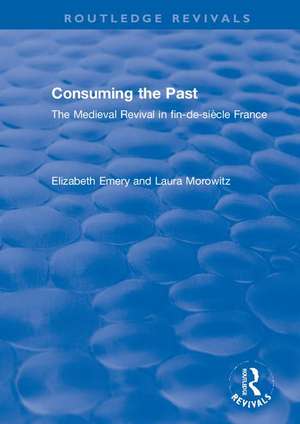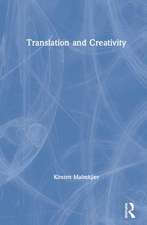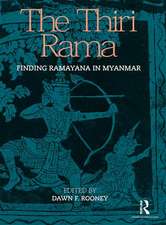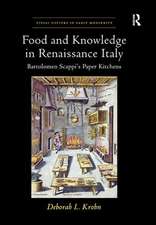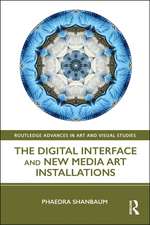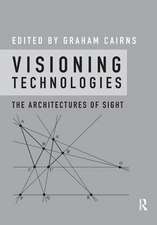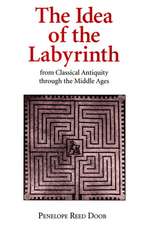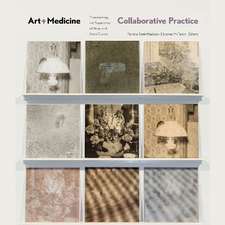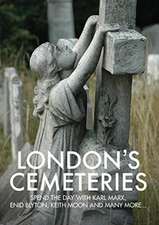Consuming the Past: The Medieval Revival in fin-de-siècle France: Routledge Revivals
Autor Elizabeth Emery, Laura Morowitzen Limba Engleză Paperback – 31 mar 2021
| Toate formatele și edițiile | Preț | Express |
|---|---|---|
| Paperback (1) | 326.13 lei 6-8 săpt. | |
| Taylor & Francis – 31 mar 2021 | 326.13 lei 6-8 săpt. | |
| Hardback (1) | 680.73 lei 6-8 săpt. | |
| Taylor & Francis – 9 noi 2018 | 680.73 lei 6-8 săpt. |
Din seria Routledge Revivals
- 9%
 Preț: 801.71 lei
Preț: 801.71 lei - 8%
 Preț: 432.64 lei
Preț: 432.64 lei -
 Preț: 168.89 lei
Preț: 168.89 lei -
 Preț: 245.88 lei
Preț: 245.88 lei -
 Preț: 309.79 lei
Preț: 309.79 lei -
 Preț: 258.73 lei
Preț: 258.73 lei - 9%
 Preț: 764.35 lei
Preț: 764.35 lei - 9%
 Preț: 903.42 lei
Preț: 903.42 lei -
 Preț: 311.18 lei
Preț: 311.18 lei -
 Preț: 357.45 lei
Preț: 357.45 lei - 9%
 Preț: 626.93 lei
Preț: 626.93 lei -
 Preț: 317.54 lei
Preț: 317.54 lei - 9%
 Preț: 764.30 lei
Preț: 764.30 lei -
 Preț: 257.01 lei
Preț: 257.01 lei -
 Preț: 238.40 lei
Preț: 238.40 lei -
 Preț: 259.48 lei
Preț: 259.48 lei - 9%
 Preț: 938.10 lei
Preț: 938.10 lei -
 Preț: 341.33 lei
Preț: 341.33 lei -
 Preț: 264.10 lei
Preț: 264.10 lei -
 Preț: 294.98 lei
Preț: 294.98 lei -
 Preț: 308.89 lei
Preț: 308.89 lei -
 Preț: 207.40 lei
Preț: 207.40 lei -
 Preț: 347.50 lei
Preț: 347.50 lei -
 Preț: 302.59 lei
Preț: 302.59 lei -
 Preț: 389.40 lei
Preț: 389.40 lei -
 Preț: 257.01 lei
Preț: 257.01 lei -
 Preț: 358.30 lei
Preț: 358.30 lei - 9%
 Preț: 640.91 lei
Preț: 640.91 lei - 9%
 Preț: 619.49 lei
Preț: 619.49 lei -
 Preț: 228.88 lei
Preț: 228.88 lei -
 Preț: 265.16 lei
Preț: 265.16 lei -
 Preț: 257.90 lei
Preț: 257.90 lei -
 Preț: 266.06 lei
Preț: 266.06 lei -
 Preț: 258.73 lei
Preț: 258.73 lei -
 Preț: 384.01 lei
Preț: 384.01 lei -
 Preț: 246.38 lei
Preț: 246.38 lei - 9%
 Preț: 832.08 lei
Preț: 832.08 lei -
 Preț: 266.20 lei
Preț: 266.20 lei -
 Preț: 294.53 lei
Preț: 294.53 lei - 18%
 Preț: 695.86 lei
Preț: 695.86 lei - 9%
 Preț: 934.96 lei
Preț: 934.96 lei - 5%
 Preț: 243.38 lei
Preț: 243.38 lei -
 Preț: 274.69 lei
Preț: 274.69 lei -
 Preț: 208.20 lei
Preț: 208.20 lei - 9%
 Preț: 659.19 lei
Preț: 659.19 lei -
 Preț: 259.69 lei
Preț: 259.69 lei - 9%
 Preț: 1038.47 lei
Preț: 1038.47 lei -
 Preț: 389.46 lei
Preț: 389.46 lei -
 Preț: 302.14 lei
Preț: 302.14 lei -
 Preț: 302.27 lei
Preț: 302.27 lei
Preț: 326.13 lei
Nou
Puncte Express: 489
Preț estimativ în valută:
62.41€ • 67.77$ • 52.43£
62.41€ • 67.77$ • 52.43£
Carte tipărită la comandă
Livrare economică 22 aprilie-06 mai
Preluare comenzi: 021 569.72.76
Specificații
ISBN-13: 9781138321212
ISBN-10: 1138321214
Pagini: 312
Dimensiuni: 174 x 246 x 15 mm
Greutate: 0.54 kg
Ediția:1
Editura: Taylor & Francis
Colecția Routledge
Seria Routledge Revivals
Locul publicării:Oxford, United Kingdom
ISBN-10: 1138321214
Pagini: 312
Dimensiuni: 174 x 246 x 15 mm
Greutate: 0.54 kg
Ediția:1
Editura: Taylor & Francis
Colecția Routledge
Seria Routledge Revivals
Locul publicării:Oxford, United Kingdom
Cuprins
Introduction 1. The Middle Ages Belong to France: Nationalist Paradigms of the Medieval 2. Packaging the Primitifs: The Medieval Artist, the Neo-Primitif and the Art Market 3. From the Living Room to the Museum and Back Again: The Institutionalization of Medieval Art 4. The Gothic Cathedral in Fin-De-Siècle France: From Gesamtkunstwerk to 'French genius' 5. From Cathedral to Cabaret: The Popularity of Medieval Stained Glass and Tapestries 6. Marketing the Sacred: Medieval Pilgrimage and the Catholic Revival 7. Feasts, Fools and Festivals: The Popular Middle Ages Conclusion Notes Selected Bibliography Index
Recenzii
'This interesting addition to the growing literature on visual culture at the fin de siècle... an intriguing and necessary interdisciplinary approach... a text that both assembles a rich diversity of material and opens up substantial questions about attitudes to tradition in the early decades of the Third Republic... emphatic and even startling... Consuming the Past makes a valuable contribution to our understanding of how fin-de-siècle France negotiated tradition and [...] performs something of the same function for the middle ages as Debora Silverman's 1989 book on Art Nouveau did for the Rococo.'
- Richard Thomson, The Burlington Magazine
'...well-written...Highly recommended. All levels and libraries.'
- Choice
'This monograph has much to recommend it to readers interested in both medievalism and the medieval period.'
- Bonnie Effros, The Medieval Review
'Consuming the Past is a well-produced object unto itself. It has rich, clear illustrations and engravings ranging over medieval and revival artworks and documentation, and the voices of the two authors, either by affinity or editing, work well with each other in measured descriptions and analytical narratives. The great strength of this work is the self-stated complexity with which the authors address their task.' H-France Review
'... a well-written and researched study.'
- Church History
'...readable and well structured study... This jointly authored book demonstrates the merits of interdisceplinary collaborations when embarking on the difficult project of widening methodological frameworks to achieve a truly cultural, rather than literary or art-historical study. The seven chapters lucidly juxtapose the multivalent impact of medievalism in France at the fin de siecle.’
- Art History
- Richard Thomson, The Burlington Magazine
'...well-written...Highly recommended. All levels and libraries.'
- Choice
'This monograph has much to recommend it to readers interested in both medievalism and the medieval period.'
- Bonnie Effros, The Medieval Review
'Consuming the Past is a well-produced object unto itself. It has rich, clear illustrations and engravings ranging over medieval and revival artworks and documentation, and the voices of the two authors, either by affinity or editing, work well with each other in measured descriptions and analytical narratives. The great strength of this work is the self-stated complexity with which the authors address their task.' H-France Review
'... a well-written and researched study.'
- Church History
'...readable and well structured study... This jointly authored book demonstrates the merits of interdisceplinary collaborations when embarking on the difficult project of widening methodological frameworks to achieve a truly cultural, rather than literary or art-historical study. The seven chapters lucidly juxtapose the multivalent impact of medievalism in France at the fin de siecle.’
- Art History
Notă biografică
Laura Morowitz, Elizabeth Emery
Descriere
First published in 2003 Consuming the Past maps the cultural history of the period from the end of the Franco-Prussian war to the 1905 separation of Church and State illuminating the powerful appeal that the medieval past held for a society undergoing the rapid changes of industrialisation.
